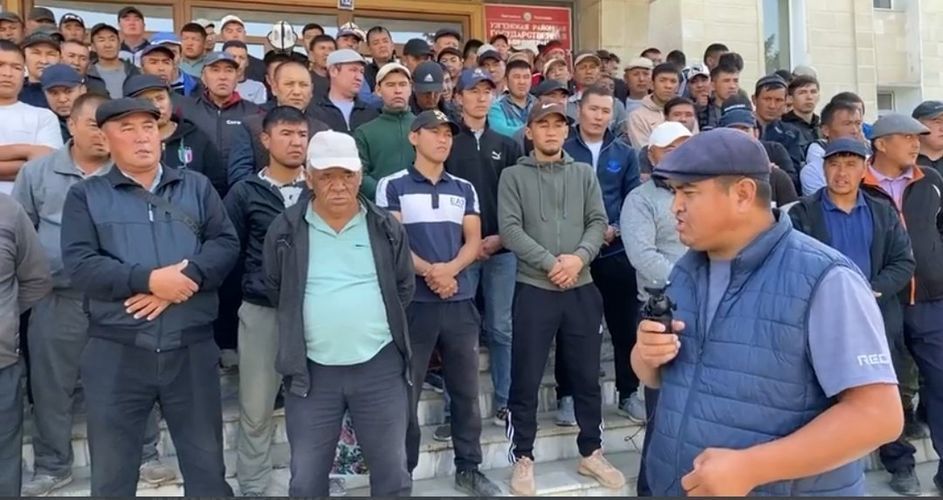The Kyrgyz parliament approved the outline for an agreement of a new border between Uzbekistan and Kyrgyzstan. The outline includes handing over the Kempir-Abad water reservoir to their Uzbek neighbours. The news has caused a stir in the country.This article was originally published on Novastan’s French website on 27 October 2022.
On 10 October the Kyrgyz Supreme Council’s Committee on International Affairs and Defense gathered to vote on the outline for an agreement to hand over a debated region to Uzbekistan. Particularly debated in this project is the Kempir-Abad water reservoir bordering Uzbekistan in the Osh Region. According to the Kyrgyz news agency 24.kg, the reservoir is 4400 hectares and holds almost 1.9 cubic kilometers of water. It is of great importance to the inhabitants in the region as a source of water for both human consumption and agriculture. According to the agreement’s outline, the reservoir would be handed over to Uzbekistan. If the agreement is signed, then Kyrgyzstan would receive 19 700 hectares of land in return. However, considering how dependent the local population is on the water reservoir, the handover is proving very difficult.
A secret vote
The vote on 10 October on the outline of the agreement occurred behind closed doors. According to reports from Kyrgyz media Kaktus, the details of the project were not shared with the public in order to prevent any uproar. Furthermore, only 10 out of the 15 representatives of the committee were present. Only a portion of the agreement’s text was shared with them on the day of the vote – actions that are unconstitutional according to the American media agency Eurasianet. The agreement was approved with six “yes” and four “no” votes. The delegates who voted against the agreement illuminated the details of the affair on the very same day. Delegate Chingiz Aidarbekov reported to 24.kg that he had not seen the document. “I said that I couldn’t vote for the agreement before I read it. So I voted against it,” he said.
A failed cover-up
This situation has led to criticism towards the Kyrgyz government. After the procedural errors were made public, the parliament declared that the agreement could be voted upon only after a plenary session with the representatives and the president, as required by pre-defined protocols. The controversy is particularly strong in the Osh Region and the border city Özgön, where, after becoming aware of the affair, a committee for the protection of the Kempir-Abad reservoir was established. The committee, which considers itself to be defending Kyrgyz sovereignty over the reservoir and representing the affected community, is made up of politicians, activists, and civil actors. Numerous demonstrations have been organized, which have been attended by several dozen people.
Repression against protests
The government of President Sadyr Japarov reacted to the oppositionist protests with repressive measures. On 23 October the houses of about a dozen oppositionists and activists were searched, according to Eurasianet. Some of them were imprisoned. The authorities claim that the arrests occurred due to attempted organizing of mass unrest, but did not give an exact number of how many were arrested. The president later explained that these oppositionists were “provocateurs” who would try to build the foundation for his overthrow. These statements were immediately condemned by the opposition, who pointed out the authoritarian nature of the authorities vis-à-vis a non-violent civil movement.
A touchy subject
Prior to his election in 2021, Japarov based his campaign on the defense of Kyrgyz sovereignty. The outline of the agreement is therefore seen as him going back on promises made almost two years ago. The government is engaging in risky two-faced behaviour on the national level. To justify the agreement, Japarov claims that joint management of the reservoir is planned. The Russian daily Kommersant reports that Japarov considers this an improvement over the previous administration of the dam.
Media in Kyrgyzstan increasingly threatened
According to Eurasianet, the arrests on 23 October have occurred in the broader context of attempts to control the opposition and the media. The government has imprisoned activists and journalists regularly in the past several months, and now wants to pass a law which would lead to greater control over independent media to reduce its influence. None of the parties which have taken a stance against this law were present during the drafting of the law’s text. Read more on Novastan: Kyrgyzstan: Journalists complain about attempts to hack their accounts The Kyrgyz news portal Kloop discovered that Radio Azattyk, the Kyrgyz branch of Radio Free Europe and one of the most important critical media voices in the country, was blocked for two months in a decision made by the Ministry of Culture on 26 October. Radio Azattyk supposedly spread false information about the conflict with Tajikistan and therefore had their site blocked in accordance with the law “On protection from incorrect information,” signed in August 2021. This law allows the government to block websites which are viewed as brokers of fake information without a court order.
Written by the editors of Novastan’s French website
Translated from French to German by Michèle Häfliger
Translated from German to English by Mari Paine
Edited by Maya Ivanova
For more news and analysis from Central Asia, follow us on Twitter, Facebook, Telegram, Linkedin or Instagram.
 Kyrgyzstan: Handover of water reservoir to Uzbekistan leads to protests
Kyrgyzstan: Handover of water reservoir to Uzbekistan leads to protests 



